

Overfishing Causes - Revolution. Demanding Too Much, Knowing Too Little Fish market scale Today, any number of seafood products line store shelves and markets.
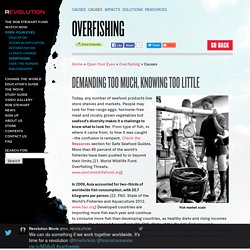
People may look for free-range eggs, hormone-free meat and locally grown vegetables but seafood’s diversity makes it a challenge to know what to look for. From type of fish, to where it came from, to how it was caught –the confusion is rampant. Check the Resources section for Safe Seafood Guides. In 2009, Asia accounted for two-thirds of worldwide fish consumption, with 20.7 kilograms per person.[22. The Earth Times. A global environmental problem, threat to our oceans and disaster. <p class="alert">You seem to have javascript turned off.
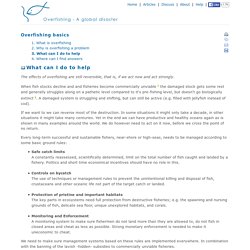
While you won't loose out on any information this site does uses javascript for some of its features. You might want to turn it on in order to enjoy the full experience. </p> Overfishing basics The effects of overfishing are still reversible, that is, if we act now and act strongly. When fish stocks decline and and fisheries become commercially unviable 1 the damaged stock gets some rest and generally struggles along on a pathetic level compared to it's pre-fishing level, but doesn't go biologically extinct 2. If we want to we can reverse most of the destruction. How the world can stop overfishing – A case study of U.S. fishery success. By Orion McCarthy THE 1990s are remembered as a time of relative prosperity.
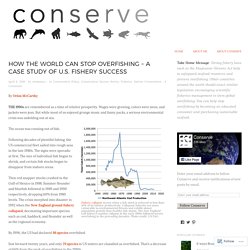
Wages were growing, colors were neon, and jackets were jean. But while most of us enjoyed grunge music and fanny packs, a serious environmental crisis was unfolding out at sea. Fishery collapse occurs when a fish stock is reduced to less than 10% of its historic productivity. Shark Alert! Species Struggle. Environmental Threats. Overfishing Intro - Revolution. Discover the threats, causes and impacts, and how you can help.
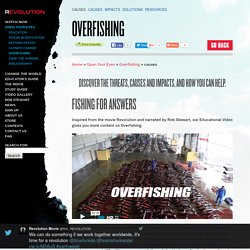
Fishing for Answers Inspired from the movie Revolution and narrated by Rob Stewart, our Educational Video gives you more content on Overfishing. Fish are the first vertebrates on Earth and evolved into the diverse array of vertebrates you see today. Look back in your family tree, about 530 billion years ago, and there will be a prehistoric fish.[1. About.com fish Evolution.] Sharks are overfished for their fins Just recently census scientists increased the number of known marine species to about 250,000. Declining Fish. Overfished fish. Overfishing puts $42bn tuna industry at risk of collapse. Overfishing is jeopardising a global tuna industry worth more than $42bn (£29bn), according to the first assessment of its kind.
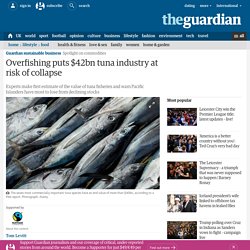
A report produced by the Pew Charitable Trusts has highlighted the significant revenues that fishermen, processors and retailers are generating from severely depleted species of tuna. Taken together, the seven most commercially important tuna species – skipjack, albacore, bigeye, yellowfin, atlantic bluefin, Pacific bluefin and southern bluefin – generated $12bn (£8bn) for fishermen in 2014, while the full value, including the total amount paid by the final consumer at supermarkets and restaurants around the world, was estimated to be $42bn (£29bn).
“It’s no secret that tuna are big business,” said Amanda Nickson, Pew’s director of global tuna conservation. Effects of Overfishing on Wild Seafood Populations from the Seafood Watch Program at the Monterey Bay Aquarium. Large Fish Are the First to Go Fish that are large in size, live a long time and are slow to reproduce are among the most vulnerable to overfishing.
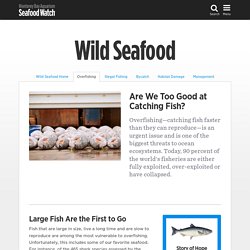
Unfortunately, this includes some of our favorite seafood. For instance, of the 465 shark species assessed by the International Union for Conservation of Nature, 74 are listed as vulnerable, endangered or critically endangered. Several species of rockfish—a group of Northeast Pacific fish also known as snapper that can live to be over 100 years old, were severely depleted by years of overfishing. Despite new and effective fishing restrictions, it will be decades before these long-lived fish recover. Fishing Down the Food Web. Overfishing. Overfishing occurs when more fish are caught than the population can replace through natural reproduction.
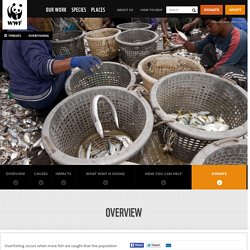
Gathering as many fish as possible may seem like a profitable practice, but overfishing has serious consequences. The results not only affect the balance of life in the oceans, but also the social and economic well-being of the coastal communities who depend on fish for their way of life. What causes overfishing? How does overfishing happen?
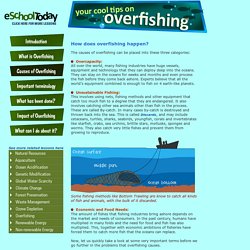
The causes of overfishing can be placed into these three categories: Overcapacity: All over the world, many fishing industries have huge vessels, equipment and technology that they can deploy deep into the oceans. They can stay on the oceans for weeks and months and even process the fish before they come back ashore. Experts believe that all the world’s equipment combined is enough to fish on 4 earth-like planets. Taking the ocean floor for citys. Understanding overfishing. Study highlights snowball effect of overfishing / December / 2013 / 24/7 News Archive / More FSU News - Florida State 24/7. Florida State researchers Felicia Coleman and Joseph Travis.

Florida State University researchers have spearheaded a major review of fisheries data that examines the domino effect that occurs when too many fish are harvested from one habitat. The loss of a major species from an ecosystem can have unintended consequences because of the connections between that species and others in the system. Moreover, these changes often occur rapidly and unexpectedly, and are difficult to reverse. “You don’t realize how interdependent species are until it all unravels,” said Felicia Coleman, director of the Florida State University Coastal and Marine Laboratory and a co-author on the study.